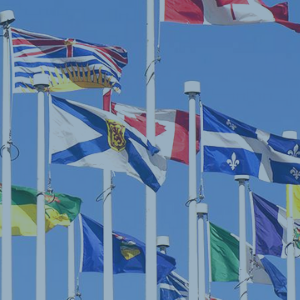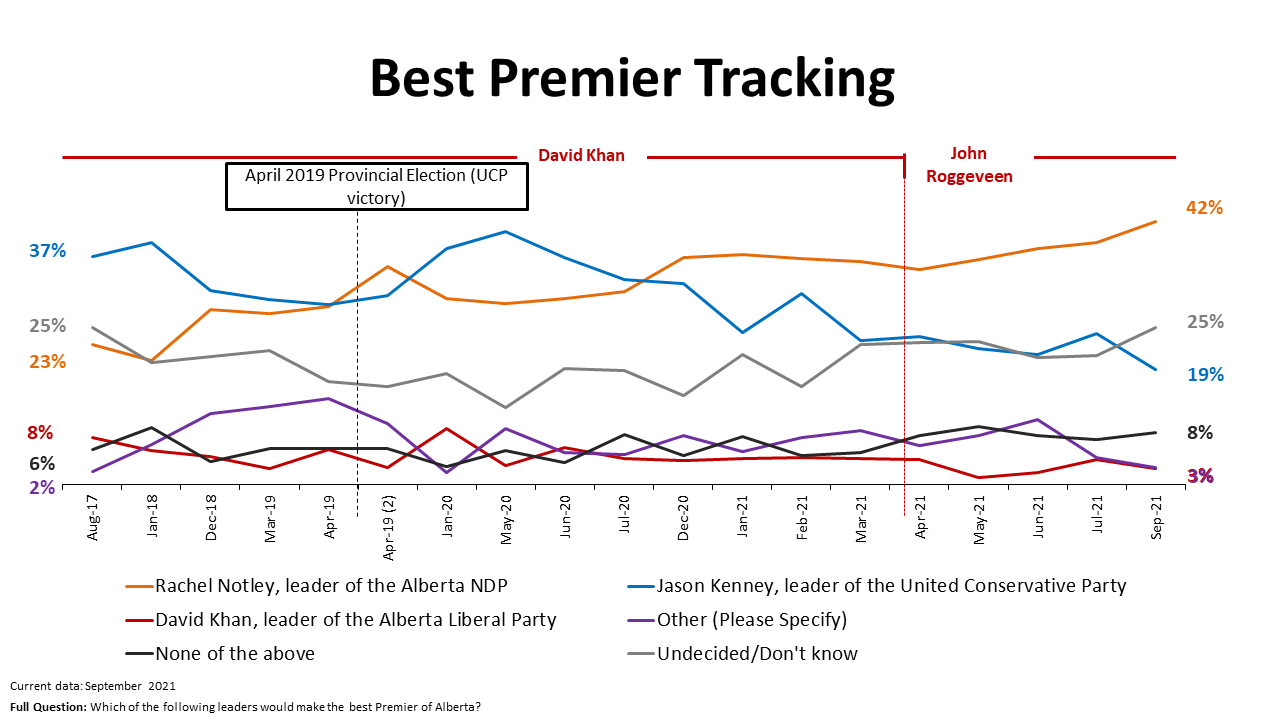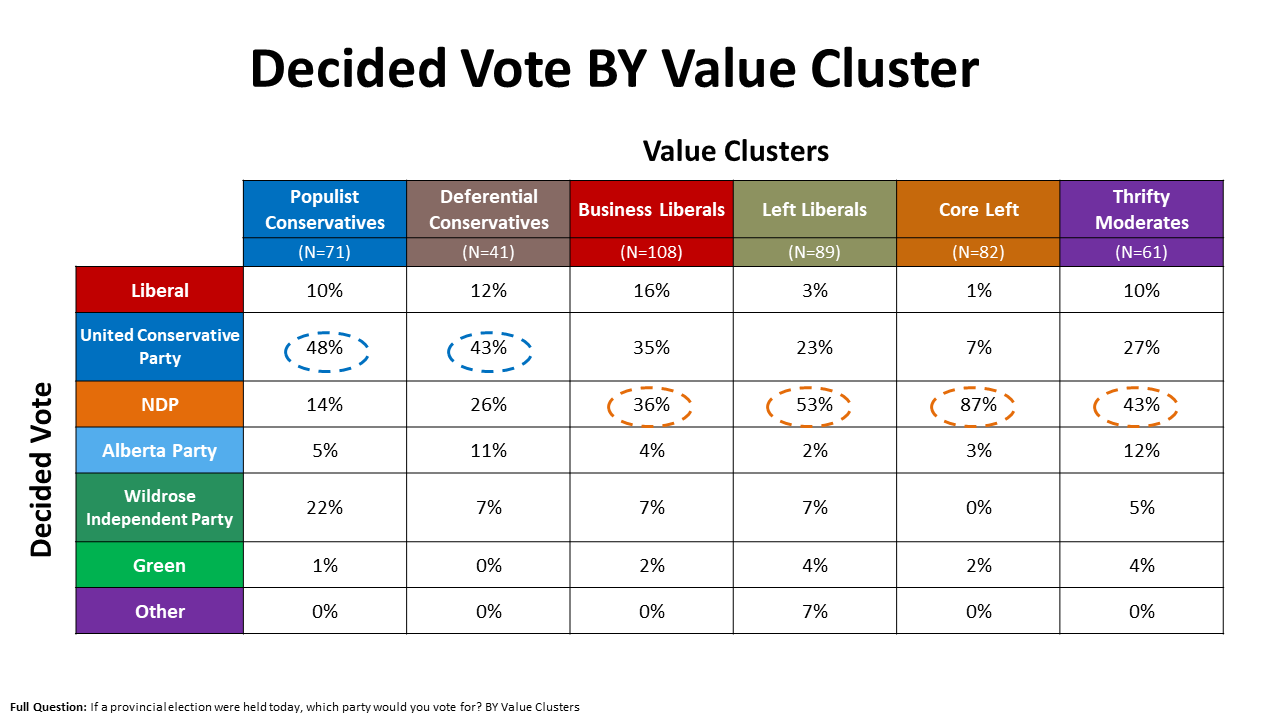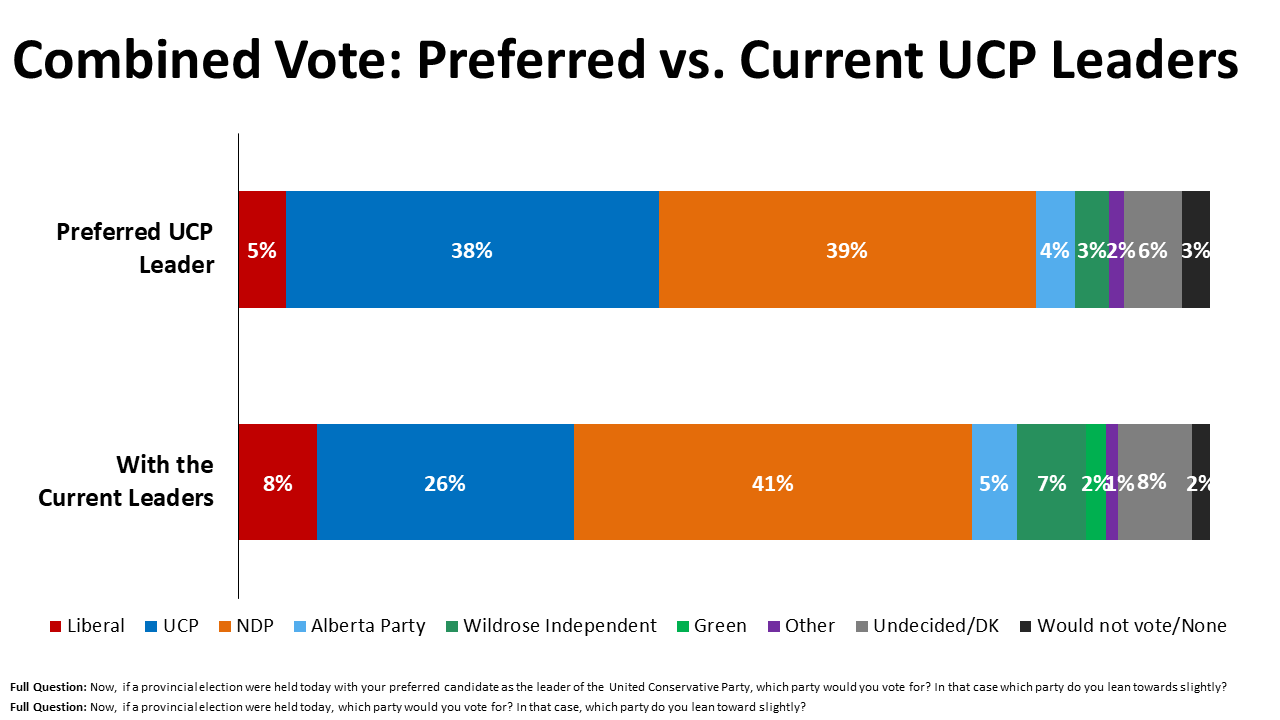
While the UCP trails the NDP by 15 points today, a UCP leadership change could put the UCP back in contention. These are the findings from a new INNOVATIVE release of the September 2021 Canada This Month survey in field from September 24th to October 5th with a weighted sample size of 500 Alberta residents. Detailed methodology is provided in the appendix.
Government Approval
The UCP government continue to sit in a deep hole with 7-in-10 Albertans at least somewhat dissatisfied with their government. Although satisfaction with the government has improved marginally since last tracking, the trend of major dissatisfaction with the current UCP government continues.
Dissatisfaction with COVID-19 management remains a key factor driving down government approval. More than two thirds (68%) disapprove of the Alberta government’s handling of the pandemic, a record low in our tracking since March 2020.
Alberta Leadership
Rachel Notley (NDP) is the only provincial leader with more Albertans feeling favourable than unfavourable towards her (net favourable: +10%). By comparison, unfavourable impressions of Kenney are at an all-time high since his tracking began in 2017 (net favourable: -47%). Further, Notley (42%) has a 24-point advantage over Kenney (19%) when we asked Albertans who would make the best Premier.

Provincial Vote
The NDP (41%) continues to increase their lead over the UCP (26%) in combined vote. Only 10% have the UCP as their second choice.
Party Identification
The UCP still have a 12-point lead in Party ID (the political equivalent of brand affinity), so there is still the potential for a recovery. However, currently 13% of UCP identifiers are defecting to the NDP while 11% are defecting to the Wildrose Independence Party.
Voter Segments: Shared Values
One-in-four (25%) of Albertans fall into “small c” conservative value clusters. Fifteen percent (15%) are Populist Conservatives, and 10% are Deferential Conservatives, who agree the role of government is equal opportunity, are not skeptical of the profit motive, are fiscally conservative, and only differ on whether the government should listen to experts or common sense.
Similarly, less than one-in-five (17%) Albertans fall into the Core Left cluster, voters who believe government should focus on redistribution, spend according to need, and feel profits bring out the worst in people.
More than half of Albertans fall into more centrist groups. We find two types of “small l” liberal groups, voters who put creating opportunity ahead of redistribution but who feel government spending should be based on need, not ability to pay.
The biggest group (23%) are “Business Liberals” who believe profit encourages hard work. “Left Liberals” make up 20% of the electorate and feel profit bring out the worst in people.
The final group are what we call the “Thrifty Moderates”. These voters want a government that will provide strong social programs and a helping hand in the economy, but they want to pay as they go. This group is open to voting for any party.

Looking at these value segments by decided vote, the NDP leads in all value clusters except among the Deferential and Populist Conservatives. The NDP dominate their base with 87% support among the core left and enjoy strong leads among Left Liberals [NDP (53%), UCP (23%)] and the Thrifty Moderates with 43% NDP, compared to just 27% for the UCP. They are even statistically tied with the UCP among Business Liberals [NDP (36%) vs UCP (35%)].
Voter Segments: Shared Economic Perspectives
We first started paying close attention to economic alienation during the 2016 US Presidential election. This analysis groups Albertans based on two attitudes; whether they believe if you work hard you can get ahead, and whether they agree every year it gets harder to get by.
Roughly one-in-four (26%) are achievers who believe hard work will help you get ahead and who say they do NOT have a hard time getting by. Just under one-in-three (30%) are strugglers who believe if you work hard you can get ahead but are struggling to pay their bills. Over a quarter (27%) are economically alienated voters who reject the idea that you can get ahead through hard work. Finally, just under one-in-five (18%) are ambivalent. They don’t really have any views on these statements. Some of the ambivalent are politically disengaged and don’t vote. Others just care about things other than finances.
Through this lens, the NDP lead looks broad, winning three of four segments. First, the NDP (42%) are ahead of the UCP (36%) among “Achievers”. Then, for the “Ambivalent”, the NDP (50%) are the clear choice compared to the UCP (29%). Next, for the economically “Alienated” (over a quarter of Albertans), the NDP (67%) has a 48-point lead over the UCP (19%). Even in the one economic segment the UCP leads (32%) (the “Strugglers”), the NDP are just six-points behind at (26%) support.
UCP Leadership
Seven-in-ten Albertans (70%) believe that Premier Jason Kenney should step down before the next election. When we ask vote when respondents were given the option to vote for their preferred UCP leader, the UCP combined vote (vote + lean) increased by 12 points, creating a neck and neck race with the NDP.

When Albertans are asked how they feel about eight possible leadership candidates, Brian Jean stands out as having the highest awareness and the highest favourables. Tyler Shandro stands out as the second highest awareness and the highest unfavourables by a wide margin. The other candidates have similar proportions of favourables and unfavourables views with all but Rick McIver having over half of Albertans without any real impression. If any of those candidates were to run, their campaigns will play a critical role in creating their brand.
Given his early lead in awareness and favourables, it is not a surprise to find a plurality (19%) report thinking that Brian Jean would make the best premier among the eight possible UCP candidates we tested. Over half (57%) could not or would not pick any of that groups to be the best premier. Again, this suggests any leadership campaign will have some work to do to define that candidate as the change Albertans are looking for.
If the election were held today and respondents could vote for their preferred leader of the UCP, the horserace becomes a statistical tie. The NDP win the support of 39% of vote compared to 38% for the UCP. The UCP finds gains right across the spectrum of time-for-a-change segments with the highest gains in conflicted segment. Given limited room for additional gains in those segments, to win re-election, a new UCP leader would need to reduce time-for-a-change sentiment by demonstrating change during their transition in the lead up to the election.
Summary
Right now, the UCP is in a tough spot. The NDP has:
- a double-digit lead in vote,
- the leader most think would make the best Premier, and
- 70% of Albertans who want Kenny out.
Even more, the NDP appear to have a broad-based lead through the various economic/values segments explored in this research.
That said, this survey shows a new leader can open the door to a UCP recovery. However, having different faces doing the same things the same way leaves the election outcome uncertain. A new UCP leader will have to demonstrate the change Albertans are looking for to regain a lead over the Notley NDP.




































